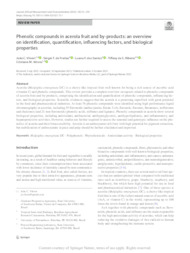Phenolic compounds in acerola fruit and by-products: an overview on identification, quantification, influencing factors, and biological properties.
Phenolic compounds in acerola fruit and by-products: an overview on identification, quantification, influencing factors, and biological properties.
Autoria: VILVERT, J. C.; FREITAS, S. T. de; SANTOS, L. F. dos; RIBEIRO. T. da S.; VELOSO, C. M.
Resumo: Acerola (Malpighia emarginata DC) is a cherry-like tropical fruit well-known for being a rich source of ascorbic acid (vitamin C) and phenolic compounds. This review provides a complete overview on aspects related to phenolic compounds of acerola fruit and by-products, comprising the identification and quantification of phenolic compounds, influencing fac- tors, and biological properties. Scientific evidences suggest that the acerola is a promising superfruit with great potential in the food and pharmaceutical industries. At least 76 phenolic compounds were identified using high performance liquid chromatography in acerolas, including 55 flavonoids (anthocyanins, flavan-3-ols, flavonols, flavones, flavanones, isoflavones and chalcones) and 21 non-flavonoids (phenolic acids, stilbenes and lignans). Phenolic compounds in acerola show several biological properties, including antioxidant, antibacterial, antihyperglycemic, antihyperlipidemic, anti-inflammatory, and hepatoprotective activities. However, studies are further required to assess the seasonal and genotypic influence on the phenolics of acerola and their bioaccessibility. Acerola is an anthocyanin-rich fruit with high potential for pigment extraction, but stabilization of anthocyanins in juice and pulp should be further elucidated and improved.
Ano de publicação: 2024
Tipo de publicação: Artigo de periódico
Unidade: Embrapa Semiárido
Observações
1 - Por padrão são exibidas publicações dos últimos 20 anos. Para encontrar publicações mais antigas, configure o filtro ano de publicação, colocando o ano a partir do qual você deseja encontrar publicações. O filtro está na coluna da esquerda na busca acima.
2 - Para ler algumas publicações da Embrapa (apenas as que estão em formato ePub), é necessário ter, no celular ou computador, um desses softwares gratuitos. Sistemas Android: Google Play Livros; IOS: iBooks; Windows e Linux: software Calibre.
Acesse outras publicações
Acesse a Base de Dados da Pesquisa Agropecuária (BDPA) para consultar o acervo completo das bibliotecas da Embrapa.

